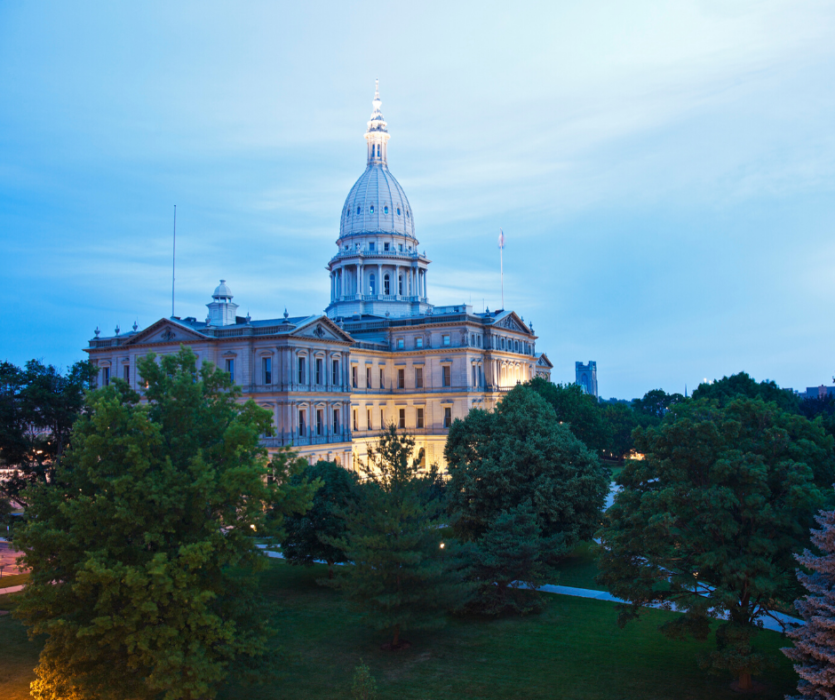
Senate Passes Economic Development Plan, Dollar Signs Coming Up Next Week
December 14, 2021
The Senate approved its side of the massive economic development plan, which would produce new incentive programs in hopes that Michigan will be more ripe for large-scale business endeavors.
“These bills that are in front of us right now deal with site preparation, water, sewer, electric, fire, curb cuts … these are community developments,” said Senate Economic and Small Business Development Chair Ken Horn (R-Frankenmuth), explaining the package would equip Michigan counties and communities to leverage dollars and indulge in real investments.
Horn, who’s been a strong-standing supporter of business incentives, explained that Michigan’s 4.25% income tax will pay back what the state drops on incentive investments over time. Additionally, the Senator illustrated the potential for vibrant neighborhoods on the floor, contemplating the opportunities missed out on when Ford Motor Co. anchored down its plans for a $5.6 billion electric vehicle and battery campus in Tennessee.
Overall, Ford – the Dearborn-based automaker – will be spending $11.4 billion for a “Megasite” in Tennessee, which will employ 6,000 individuals, and twin battery factories in Kentucky.
“The Ford Motor Company made their announcement and we’ve talked about it and we’ve talked about it…and now we’re doing something about it,” Horn said. “What will the community immediately surrounding Blue Oval (City) in Tennessee look like in 20-30 years? How many houses will be built? How many sandwich shops? How many restaurants, bars, churches, gas stations…?”
By the time the House passed its version of the three economic development bills on Wednesday evening, eyes were turned toward the non-disclosure agreements that were signed by legislative leaders at the start of creating the reform package.
Political insiders have highlighted the non-disclosure agreements as an unprecedented phenomenon in Michigan, with sources explaining that some lawmakers and staffers need to be given a notice on what type of projects will be heading toward Michigan if the bills are signed into law.
Currently, there are no dollar signs attached to this package, but it is anticipated that a supplemental will be attached to it next week for assisting small businesses. Overall, Dec. 14 could likely be the day the Legislature launches the package toward the Governor’s office, with price tags connected.
SB 769 from Sen. Kim LaSata (R-St. Joseph), SB 770 from Sen. Curtis VanderWall (R-Ludington) and SB 771 from Sen. Roger Victory (R-Hudsonville) each passed 27-10.
The House versions of the package include HB 5602 from Rep. Jack O’Malley (R-Lake Ann), HB 5603 from Rep. Julie Calley (R-Portland) and HB 5604 from Rep. Ben Frederick (R-Owosso).
VanderWall told the media there were a lot of projects in the works, and that General Motors Co. “has some new expansions that they’re looking at.”
“What this bill does is allows us to negotiate and make sure that we take care of Michigan businesses, businesses that are in the United States…the ones that we want to keep here and not leave our area,” VanderWall said. “So it’s extremely important that we give Michigan the tools to be able to compete for those jobs.”
The package creates the Strategic Outreach and Attraction Reserve fund, an umbrella fund that fuels the following secondary funds:
– The Michigan Strategic Site Readiness Fund, which provides grants, loans and other economic help to generate investment-ready sites prepared for agreeable development.
– The Critical Industry Fund, which provides the money needed to “close the deal.” Whatever the company needs to make the numbers work, this fund helps.
“With the bills in front of us today, I have been working incredibly hard with many stakeholders to understand that this must be a step,” said Sen. Mallory McMorrow (D-Royal Oak), the minority vice chair of the Senate Economic and Small Business Development Committee, explaining Michigan can be and will be “the state where if you are inventing the future of mobility or the next big thing, it will be here.”
Opponents of the package came from both sides of the aisle, flagging down that there were gaps in equitable opportunity, small business aid and consideration of environmental impacts under the new incentive programs.
Sen. Erika Geiss (D-Taylor) offered amendments revamping the bills “to bolster diversity, equity and inclusion,” but they were shot down earlier in session.
“Being intentional and direct with an equity lens and framework will help affect change so that more people, companies, organizations and institutions have access to these types of economic tools,” Geiss said. “The failure of my amendments to pass – which were offered with the goal of improving the legislation, improving the policy for us to think and act boldly and differently and inclusively – and it’s the failure of those (attempts) is why I’ll be voting today I will be voting no.”
According to McKinsey & Company, Black-owned businesses continue to be 20% less likely than white-owned businesses to obtain a loan from a large bank.
Additionally, although the federal Paycheck Protection Program offered $377 billion to small businesses earlier in the COVID-19 pandemic, Black-owned businesses often lacked a supportive network to help with acquiring those dollars. Geiss suggested that history could be repeated under the new package.
Sen. Tom Barrett (R-Charlotte) also opposed the legislation, asking “Would we not be wiser to invest in the needs that we know from empirical evidence that are higher on the list of priorities for companies looking for site locations, and also at the same time benefit all of our residents?
“Would major corporations rather have reliable transportation with smooth roads to get their goods to market? Or would they rather have cash in their pocket as a settlement to make up for the potholes outside of their facility?” Barrett asked rhetorically on the Senate floor.